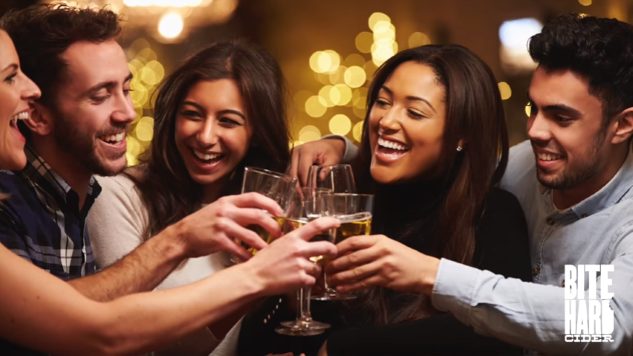This Hard Cidery’s Press Release is Incredibly, Unwittingly Sexist
Photo via Bite Hard, YouTube
Craft beer, as an industry and as a community, does tend to try its hardest to be a welcoming place for all genders. It’s something of an uphill battle, as the macro beer market in particular was male-dominated for so long that there was a time when a woman ordering even a domestic light lager was met with raised eyebrows. The vast majority of craft breweries, meanwhile, recognize that they can’t exactly afford to turn down the business of the rapidly growing female craft beer segment via sexist marketing. After all, women consumed 33% of all craft beer in the U.S. back in 2014 (the most recent statistic), and that number has only risen since. Within a few years, the craft customer base will be truly egalitarian, right around 50/50. And at the same time, more craft breweries owned or operated by women come online every day.
Which is why it’s so sad—and let’s face it, funny, in a pathetic sort of way—when craft beer and cider companies still occasionally struggle with displaying overt sexism in their marketing materials. Sometimes it’s in the use of sexuality via beer labels, which is something I’ve written about in detail before. And other times, it’s much more blatant and direct. This is one of those times.
The other week, I received a press release from a hard cider producer in Boonville, CA called Bite Hard. I didn’t really think anything of it at first, unwrapping a few bottles of dry and semi-sweet cider, of the sort Paste receives multiple boxes of on any given day. But then I got around to actually reading the press release. Here’s a single paragraph of that release.
The craft cider movement was originally created for—and driven by—the girlfriends of craft beer drinkers. Men and women’s palates and taste preferences differ … in large part because women have more taste buds than men, making females anatomically superior tasters. Men who like craft beer tend to prefer “hoppy” tastes. The craft beer drinker’s girlfriend was seeking an alternative.
Yikes. Reading it, I couldn’t help but shake my head and laugh. I’ve read a lot of weird stuff in press releases, but I can’t remember the last time I read something so blatantly, cluelessly sexist. In only a few sentences, they make so many assumptions, generalizations and oversimplifications, both positive and negative. And the cherry on top is that it seems to be written with a goal of accomplishing nothing. There’s no outcome that could come out of any of that text that would possibly be desired. So let’s dive into each incredibly misguided bit in greater detail.
“The craft cider movement was originally created for—and driven by—the girlfriends of craft beer drinkers.”
Bite Hard implies that the entire cider industry sprang up to serve the girlfriends of craft beer drinkers who were too intimidated by the flavors of beer and needed a product they could call their own. Note also that it’s “the girlfriends of craft beer drinkers” and not women in general. They imply that the only women drinking craft cider are those women who have been introduced into the craft alcohol segment by their craft beer-loving boyfriends, because obviously a woman can’t discover any of these things on her own. And naturally, the only women mentioned in the press release are simply defined as “the girlfriends” of (obviously male) craft beer drinkers, because in what other context could a woman possibly exist? As an independent being? Pshhhhhhhhhhh, yeah right. As one of my Facebook friends quipped when I posted the quote, “Why would women even bother existing, outside the role of being someone’s girlfriend,” right?
Moreover, why would you turn away all the potential business of MALE cider drinkers by implying that Bite Hard is a brand targeted only at “their girlfriends”? Do they not see that a sexist piece of marketing copy designating the company as being for beer-hating women also has the simultaneous effect of making the product less desirable to the same group of men they represent? When you say “women don’t like craft beer, they like this cider,” it doesn’t exactly make the average male consumer say “I’m so happy to have a feminine palate, given that I like this cider too.”
 “Give your girlfriend a shiny apple today. It will keep her coat glossy and lustrous.”
“Give your girlfriend a shiny apple today. It will keep her coat glossy and lustrous.”
“Men and women’s palates and taste preferences differ … in large part because women have more taste buds than men, making females anatomically superior tasters.”
It’s a bit of a stretch to act as if the anatomical differences mean that the majority of women or men are predisposed to like a certain type of flavor or product, but at the very least, the bit about the taste buds is scientifically accurate. What isn’t accurate is to take that information and come to the conclusion of “women are less likely to enjoy craft beer” because they’re cursed with a pox of supertasting. Do these guys (the company is operated by five white guys, naturally) never set foot in any of the taprooms of the hundreds of California craft breweries that surround them? Have they not noticed the growing parity, every single year in craft beer between the number of men and the number of women in those taprooms? Do they not see which way this industry is moving? How could you possibly miss it, when you’re operating an alcohol company? It seems impossible.
-

-

-

-

-

-

-

-

-

-

-

-

-

-

-

-

-

-

-

-

-

-

-

-

-

-

-

-

-

-

-

-

-

-

-

-

-

-

-

-








































